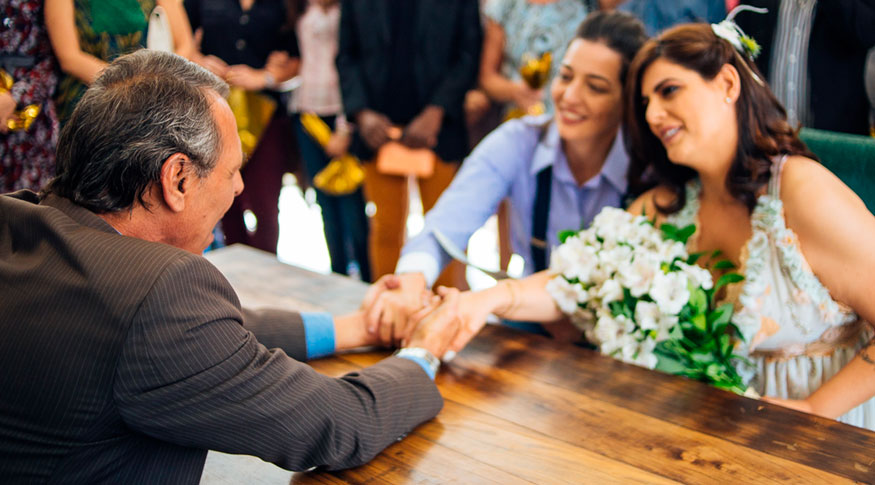Vital Statistics
Same-sex-marriages increase by 61.7% in a year marked by marital decline
December 04, 2019 10h00 AM | Last Updated: December 04, 2019 03h56 PM

Same-sex marriages escalated in 2018 against the previous year. According to Vital Statistics 2018, released today by the IBGE, 9,520 same-sex marriages decided for formal marital unions last year, versus 5,887 in 2017, which means an increase of 61.7%. Despite that growth, same-sex marriages represent only 0.9% of the total registered in the country.
According to the survey, same-sex marriages recorded a significant increase, mainly in the final months of 2018. A total 29.6% of the 3,958 marriages between men were registered in December alone. Considering couples formed by women, 34% of the 5,562 marital unions happened on the last day of last year. Among couples formed by a man and a woman, the number of marriages registered in December corresponds to 11.3% of the total.
Klívia Oliveira, manager of the survey, highlights that marriages among women accounted for most of the same-sex civil unions. Marriages between men increased by 58.3% in 2018, whereas, between women the increase hit 64.2%.
“In the biggest Major Regions, the number of same-sex marriages, in 2018, also surpassed the figure recorded in the preceding year. A highlight was the Southeast (5,689), with more than half of the marriages, followed by the Northeast (1,437) and South (1,367). The Central West and the Northeast registered, respectively, the lowest and the highest percentage of increase in this kind of civil union, 42.5% and 85.2%, respectively”, says Klívia.
Three marriages per each divorce
In 2018, Brazil registered 1,053,467 civil marriages. The total number of marital decreased by 1.6% in comparison with 2017. The number of divorces increased by 3.2%. A total 385,246 legal separations were registered. Klívia highlights that is the third consecutive year of decrease in marriages and increase in the number of divorces. “The proportion is three marriages per each divorce.”
In the Centro-Oeste (3.33%) and in the Northeast (0.75%) there was an increase in the number of marriages in 2018, against the previous year. Civil unions fell in the South (-3.27%), in the Southeast (-3.20%) and in the North (-0.8%). Last year, the Southeast concentrated half of the marriages: 505,832 of the total. The Northeast was the second region of the country having most civil unions (243,102).
Considering first-instance divorces granted, by type of family arrangement, the researcher observed a bigger proportion of the dissolutions took place among families with minor children (46.6%). Between 2008 and 2018 there was an increase by 5.6% in judicial divorces of couples with minor children only. “That shows children do not prevent divorces from happening”, Klívia Oliveira says.
In Brazil, in 2018, the average length of marriages ending in a divorce remained at 14 year. In 2008, marital unions lasted 17 years, on the average. The survey also shows that men usually divorce at older ages than women. On the date of the divorce, last year, men were 43 years of age, whereas women, 40. Couples usually get married at 30 years of age, on the average.
Shared custody records increase
The survey also showed that, last year, the percentage of divorces among couples with minor children increased to 24.4%. In 2017, that figure was 20.9%. According to Klívia, that was due to Federal Law 13,058/2014, which states shared custody is a priority, even in cases parents do not come to an agreement. “The child's time should be equally balanced between both parents, except in cases one of them declares not to have interest in having custody of them.”
In spite of that, the researcher observes that, in all the Major Regions of Brazil, women are still the majority when it comes to custody of minor children. “In 2018, in Brazil , it reached 65.4%, but was, nevertheless, below that of 2017 (69.4%), and the figure registered in 2016 (74.4%), ” Ms. Oliveira explains.




















